Neuroscience
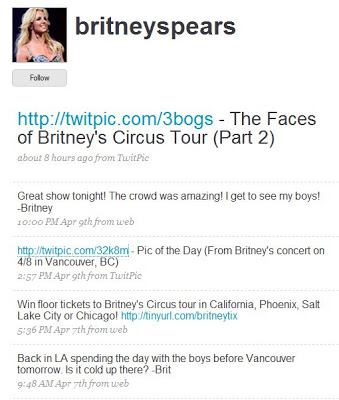
It was bound to happen. Some neuroimaging lab will conduct an actual fMRI experiment to examine the so-called "Neural Correlates of Twitter" -- so why not write a preemptive blog post to report on the predicted results from such a study, before anyone can publish the actual findings?
For those of you who don't know, Twitter is a social media application that enables microblogging (140 characters or less) and revolutionizes the way that people communicate breaking news, raise funds for worthy causes, and organize meaningful protest movements. Or else it's the refuge of narcissists suffering existential crises of identity who must broadcast their every move in a pathetic attempt to find external validation and meaning in their crushingly boring lives.
We've seen a plethora of posts on the Psychology of Twitter, most notably at Psychology Today (part 1, part 2) and World of Psychology (part 1, part 2). Now, the time for the Neurology of Twitter has arrived! However, Professor Susan Greenfield has beaten me to the punch with her fake data, as quoted below in an alarmist article in the Daily Mail:
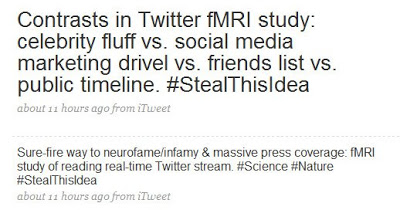
A low-level baseline condition (viewing "+") and an active baseline condition (reading the public timeline of random tweets from strangers) will be compared to three active conditions:
(1) Celebrity Fluff
(2) Social Media Marketing Drivel
(3) Friends on your Following List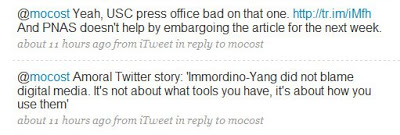
An example of the public timeline on Twitter is illustrated below. The hemodynamic response function to this active control condition will be compared to those from Conditions 1-3 above. Contrasts between each of these conditions and the low-level baseline will also be performed.

The major predicted results are as follows:
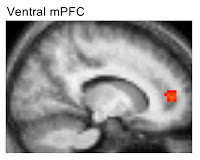
Fig. 2A. (Mitchell et al., 2006). A region of ventral mPFC showed greater activation during judgments of the target to whom participants considered themselves to be more similar.
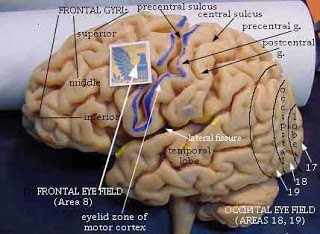
Figure from the wonderful website of Paul Pietsch, PhD (Professor Emeritus, School of Optometry, Indiana University). The frontal eye fields are in a stamp-sized zone at the posterior end of the middle frontal gyri (in both hemsipheres). The latter is part of Brodmann's Area 8. Frontal eye fields play a major role in stepwise and voluntary eye movements known as saccades.
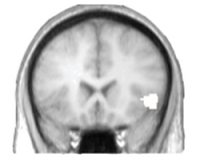
Fig. 1A (Jabbi et al., 2008). Coronal slice (y = 18) showing the location of the ROI (white) previously shown to be involved in the experience and observation of disgust.
In conclusion, we predict that the observed patterns of brain activity will be dependent on the nature of the Twitter material being read. These distinct neural networks are expected to reflect the cognitive, emotional, and visceral processes underlying the rapidly changing content of digital media, which ultimately results in "rewiring" of the brain.
Next on The Neurocritic: Ashton Kucher (@aplusk) deconstructs the outrageous headline that Twitter can make you immoral.
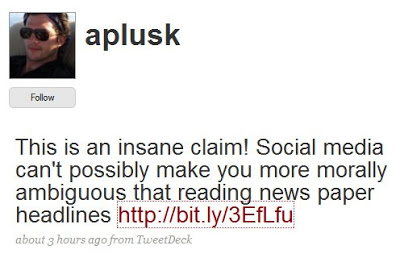
But that epic piece will have to wait until PNAS has lifted the embargo on the journal article (Immordino-Yang et al., in press) that inspired the headline (and others too):
Can Twitter Make You Amoral? Rapid-fire Media May Confuse Your Moral Compass
Twitter and Facebook could harm moral values, scientists warn
Tweet this: Rapid-fire media may confuse your moral compass
Citation (from Wired): "Neural correlates of admiration and compassion." By Mary Helen Immordino-Yang, Andrea McColl, Hanna Damasio, and Antonio Damasio. Proceedings of the National Academy of Sciences, Vol. 106, No. 15, April 13, 2009.
- Neural Correlates Of Admiration And Compassion And Envy And Schadenfreude
In light of all the sensationalistic press coverage about a journal article that wasn't publicly available last week, it's worth taking a moment to look at the actual experiment. Of course, the savvy skeptics know by now that the paper in question...
- The Neurology Of Twitter, Part 2
You think you've already seen the worst coverage of the "Twitter makes you amoral" scare [with a BONUS! overblown sound byte from the first author]... Scientists warn of Twitter dangersStory Highlights USC study says rapid-fire Twitter and news updates...
- "#hashtags In The Academy" At #scio13 On Storify
@Lalsox and my session called #Hashtags in the academy: Engaging students with social media was a great success! We had lots of great conversation which generated some (unanswered) questions as well as some terrific ideas about using social...
- Finding Old Tweets
Tweet much? Want to study tweets, or review tweets from a recent (or not-so-recent) conference? I've been asked for recommendations on software that will archive tweets, so I thought I'd post my replies here for posterity. Also for my future self....
- Twitter & The Library Of Congress
You may have seen that the Library of Congress will be archiving Tweets for the future. Here are my tweets on the topic, which should provide a brief summary of some useful articles:How Tweet It Is!: Library of Congress Acquires, Saves Entire Twitter...
Neuroscience
The Neurology of Twitter

It was bound to happen. Some neuroimaging lab will conduct an actual fMRI experiment to examine the so-called "Neural Correlates of Twitter" -- so why not write a preemptive blog post to report on the predicted results from such a study, before anyone can publish the actual findings?
For those of you who don't know, Twitter is a social media application that enables microblogging (140 characters or less) and revolutionizes the way that people communicate breaking news, raise funds for worthy causes, and organize meaningful protest movements. Or else it's the refuge of narcissists suffering existential crises of identity who must broadcast their every move in a pathetic attempt to find external validation and meaning in their crushingly boring lives.
We've seen a plethora of posts on the Psychology of Twitter, most notably at Psychology Today (part 1, part 2) and World of Psychology (part 1, part 2). Now, the time for the Neurology of Twitter has arrived! However, Professor Susan Greenfield has beaten me to the punch with her fake data, as quoted below in an alarmist article in the Daily Mail:
Social websites harm children's brains: Chilling warning to parents from top neuroscientistBy David DerbyshireLast updated at 1:45 AM on 24th February 2009Social networking websites are causing alarming changes in the brains of young users, an eminent scientist has warned.Sites such as Facebook, Twitter and Bebo are said to shorten attention spans, encourage instant gratification and make young people more self-centred.Her "fear" is based on sheer speculation without a shred of evidence. Furthermore, other fear mongering reports (PDF) have cherry-picked the existing data to support the hypothesis that Twitter is harmful to your health. So why don't we do an experiment to see exactly what happens to the brain while reading Twitter streams in real time? The purpose and the methods of the study are summarized below.
The claims from neuroscientist Susan Greenfield will make disturbing reading for the millions whose social lives depend on logging on to their favourite websites each day.. . .Baroness Greenfield, an Oxford University neuroscientist and director of the Royal Institution, believes repeated exposure could effectively 'rewire' the brain.Computer games and fast-paced TV shows were also a factor, she said.'We know how small babies need constant reassurance that they exist,' she told the Mail yesterday.'My fear is that these technologies are infantilising the brain into the state of small children who are attracted by buzzing noises and bright lights, who have a small attention span and who live for the moment.'

A low-level baseline condition (viewing "+") and an active baseline condition (reading the public timeline of random tweets from strangers) will be compared to three active conditions:
(1) Celebrity Fluff

(2) Social Media Marketing Drivel

(3) Friends on your Following List

An example of the public timeline on Twitter is illustrated below. The hemodynamic response function to this active control condition will be compared to those from Conditions 1-3 above. Contrasts between each of these conditions and the low-level baseline will also be performed.

The major predicted results are as follows:
- Reading the Tweets of your close friends will engage a network of regions involved in self-referential processing of similar others, including the posterior superior temporal sulcus (STS) and adjacent temporo-parietal junction (TPJ), and the ventral medial prefrontal cortex (Mitchell et al., 2006).

- Reading the stream of Celebrity Fluff will activate the frontal eye fields to a much greater extent than the control condition, as the participants will be engaged in rolling their eyes in response to the inane banter.

- Reading the stream of Social Media Marketing Drivel will tax the neural circuits involved in generating a feeling of disgust, including the anterior insula, ventrolateral prefrontal cortex-temporal pole, and putamen-globus pallidus (Mataix-Cols et al., 2008)

In conclusion, we predict that the observed patterns of brain activity will be dependent on the nature of the Twitter material being read. These distinct neural networks are expected to reflect the cognitive, emotional, and visceral processes underlying the rapidly changing content of digital media, which ultimately results in "rewiring" of the brain.
Next on The Neurocritic: Ashton Kucher (@aplusk) deconstructs the outrageous headline that Twitter can make you immoral.

But that epic piece will have to wait until PNAS has lifted the embargo on the journal article (Immordino-Yang et al., in press) that inspired the headline (and others too):
Can Twitter Make You Amoral? Rapid-fire Media May Confuse Your Moral Compass
Twitter and Facebook could harm moral values, scientists warn
Tweet this: Rapid-fire media may confuse your moral compass
Citation (from Wired): "Neural correlates of admiration and compassion." By Mary Helen Immordino-Yang, Andrea McColl, Hanna Damasio, and Antonio Damasio. Proceedings of the National Academy of Sciences, Vol. 106, No. 15, April 13, 2009.
- Neural Correlates Of Admiration And Compassion And Envy And Schadenfreude
In light of all the sensationalistic press coverage about a journal article that wasn't publicly available last week, it's worth taking a moment to look at the actual experiment. Of course, the savvy skeptics know by now that the paper in question...
- The Neurology Of Twitter, Part 2
You think you've already seen the worst coverage of the "Twitter makes you amoral" scare [with a BONUS! overblown sound byte from the first author]... Scientists warn of Twitter dangersStory Highlights USC study says rapid-fire Twitter and news updates...
- "#hashtags In The Academy" At #scio13 On Storify
@Lalsox and my session called #Hashtags in the academy: Engaging students with social media was a great success! We had lots of great conversation which generated some (unanswered) questions as well as some terrific ideas about using social...
- Finding Old Tweets
Tweet much? Want to study tweets, or review tweets from a recent (or not-so-recent) conference? I've been asked for recommendations on software that will archive tweets, so I thought I'd post my replies here for posterity. Also for my future self....
- Twitter & The Library Of Congress
You may have seen that the Library of Congress will be archiving Tweets for the future. Here are my tweets on the topic, which should provide a brief summary of some useful articles:How Tweet It Is!: Library of Congress Acquires, Saves Entire Twitter...
